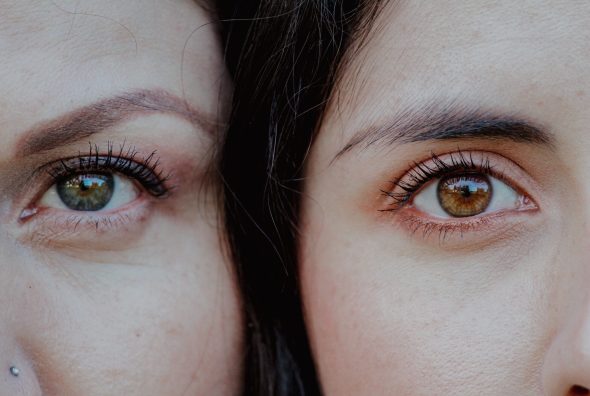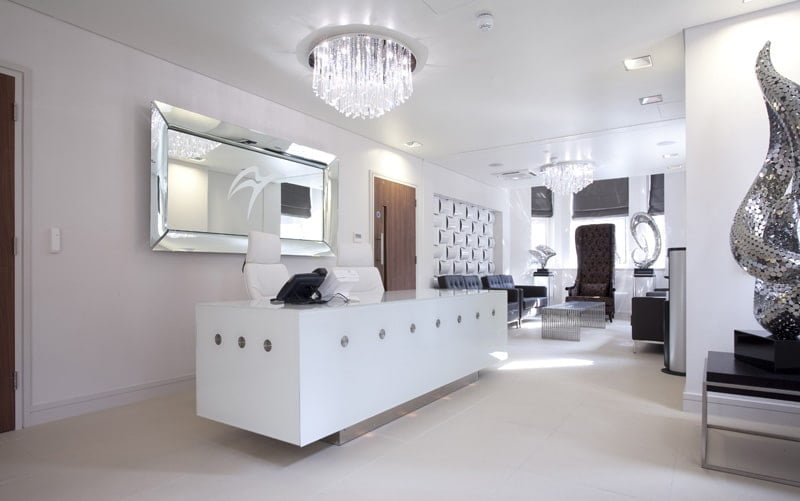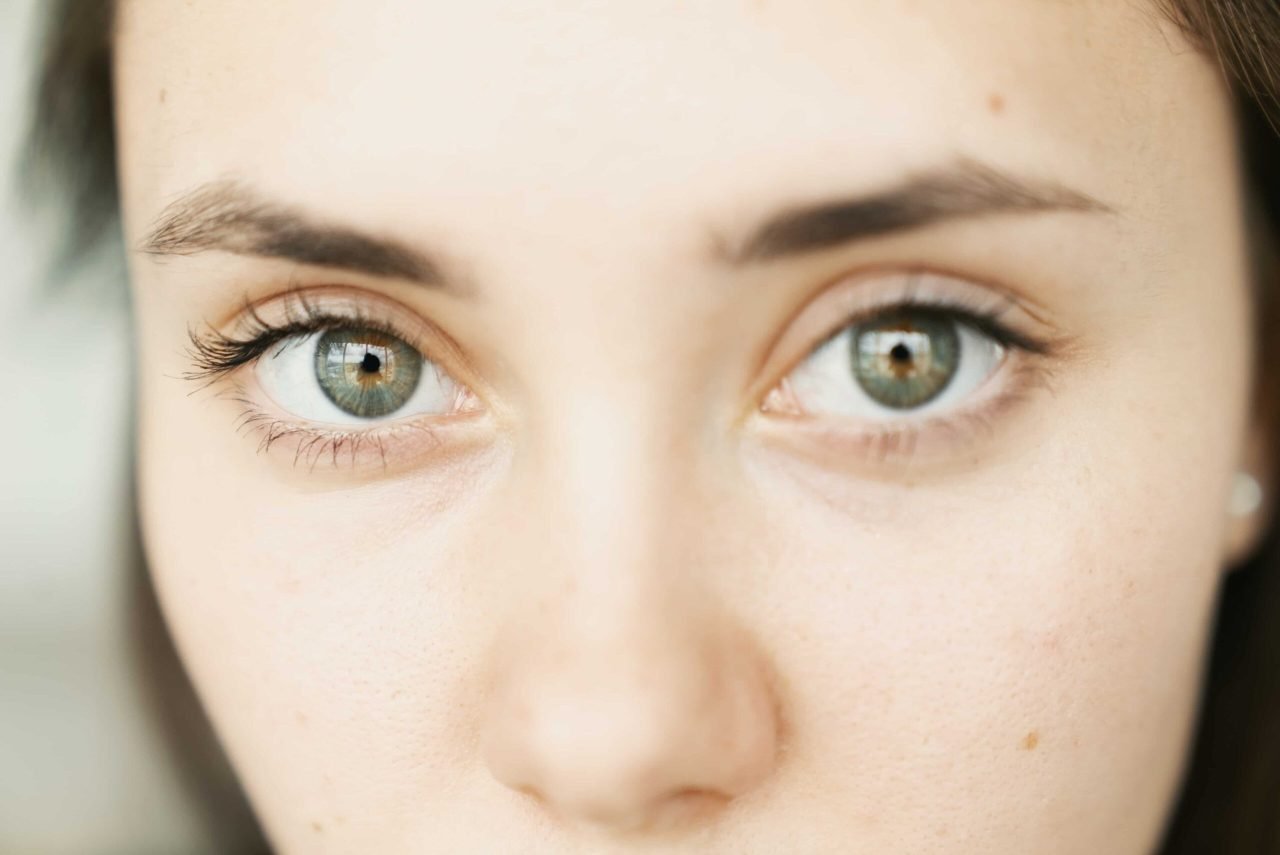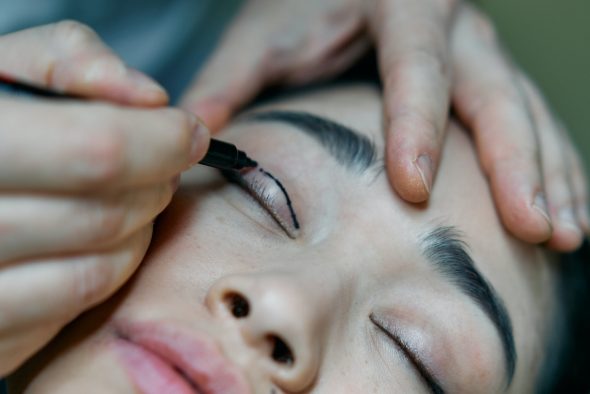

Is correction surgery for botched lid procedures a good choice for me?
Daniel Ezra, 10 March 2023

Correction surgery for botched lid procedures
Eyelid procedures are some of the most popular cosmetic surgeries. When performed by skilled and experienced surgeons, the results can be significant and give a big boost in confidence.
However, sometimes the results of these procedures do not meet the patient’s expectations, or can cause negative outcomes. More rarely and seriously, the outcomes can cause problems that can compromise the eyes themselves, leading to pain, severe dryness or changes in vision This can be a frustrating and distressing experience, but there is hope for those seeking to correct the damage.
In this article, we will explore the options for correction surgery for botched lid procedures and help you determine whether it is a good choice for you. We will discuss common problems such as hollow upper eyelids, lower lid retraction, and webbing of the lateral canthus, as well as the difference between functional and aesthetic concerns.
Read on for a thorough consideration of the risks and benefits of botched eyelid correction surgery to help you make an informed decision about whether it is right for you.
How do botched eyelid procedures occur?
Botched eyelid procedures refer to cosmetic surgeries that result in unsatisfactory outcomes or complications. These can include issues such as asymmetry, drooping, scarring, or even vision impairment. While it is not uncommon for patients to seek corrective surgeries, the frequency of such procedures varies by region and clinic.
Botched eyelid procedures are more common overseas than in the UK. In fact, in 2022, there was a 44% increase in all botched cosmetic surgeries undertaken abroad.
Surgical procedures can yield different results to those desired due to various reasons. In many cases, botched eyelid procedures occur due to factors such as surgeon inexperience, excessively aggressive surgical techniques, poor communication between the patient and surgeon, technical errors during the procedure, and inadequate post-operative care.
For this reason, patients should conduct thorough research on their surgeon and clinic, ask about their qualifications and experience, and have realistic expectations of the procedure’s outcome. They should also understand the risks and potential complications associated with the eye surgery.
The Ezra Clinic is a well-respected establishment for correction after botched eyelid procedures. In fact, correction surgery accounts for 10-20% of all our cases. Mr. Ezra is highly experienced and an authority on all aspects of cosmetic and reconstructive eyelid surgery.
Types of botched eyelid surgery
Correcting botched eyelid surgeries can be a complex process that varies depending on the type and severity of the issue. Some botched eyelid surgeries are more straightforward to correct than others. Therefore, it is essential to carefully consider the type of issue you are experiencing when deciding whether to opt for corrective surgery.
The approach to correcting botched eyelid surgery will depend on the specific issue. In some cases, the surgeon may need to perform revision surgery to correct the issue fully. In other instances, non-surgical treatments such as dermal fillers or Botox injections may be used to address the problem. Sometimes, there is no safe and effective option and you may be advised not to proceed with any correction.
When selecting a surgeon for your corrective eye surgery, it is crucial to choose someone who prioritises your needs and puts you, the patient, first. At the Daniel Ezra clinic, we believe in a patient-centred approach to treatment. We will take the time to understand your experience, medical history, and symptoms to guide our treatment plan.
Hollow upper eyelid
The excessive removal of skin, muscle, and fat during eyelid surgery can lead to a range of complications. These may include a hollow or gaunt appearance of the upper eyelid due to the loss of important structures such as fat pads. This problem is particularly prevalent in patients with naturally hooded eyelids, and therefore, it is crucial to plan the blepharoplasty procedure meticulously to preserve a natural appearance. This is the most common problem presenting to the Ezra Clinic for revision surgery.
Addressing such complications can be challenging and typically requires a multi-faceted approach that involves augmenting the volume of the upper eyelid. This can be achieved through a combination of filler injections, fat transfer, and surgical reconstruction. The use of these techniques has been shown to be highly effective in reversing the complications resulting from excessive tissue removal during eyelid surgery, as illustrated in the accompanying images. However, when the skin excision itself it too great, the likelihood of success can be limited.
Lower lid retraction
Lower eyelid retraction, which is characterised by the downward pulling of the lower eyelids following cosmetic lower blepharoplasty, is a common complication that can occur after a procedure. It is also known as post-blepharoplasty lower eyelid retraction.
Fortunately, there are several treatment options available for this condition. During a preoperative examination, it may be determined that there is sufficient skin to allow for lid elevation. In this case, a septoretractor recession and spacer graft may be utilised to elevate the posterior layers of the eyelid, effectively addressing the retraction. Multiplane midface lifting also has an important role in recruiting more skin into the lower eyelid. When the skin deficiency is too great, a skin graft may be the only way to restore eyelid position.
An essential part of this surgery is the powerful fixation of the lateral canthus (outer angle) of the eye. This can be achieved a canthoplasty, which may need to be fixed directly through the bone using drill holes.
Webbing of the lateral canthus
Lateral canthal webbing is a recognised complication that can arise from blepharoplasty, particularly when the upper blepharoplasty incision is extended below the equator of the lateral canthus or when excess skin is removed laterally.
This is a difficult complication to treat, but there are several treatment routes we can take. One approach is to rearrange the skin in a complex geometric pattern, known as a ‘z-plasty’. Where the corner is also rounded or shortened, repositioning of the lateral canthus using internal burr-holes to anchor it to the lateral wall of the eye socket may also be required. This method preserves the surrounding tissue and enables the creation of a sharper and more defined angle for the canthus.
Do I need correction surgery for functional reasons?
If you are unsure whether to opt for correction surgery, one of the most critical factors will be determining whether the problem is purely cosmetic or if it is affecting the function of your eye.
If the issue is purely aesthetic, you may want to weigh the potential risks and benefits of undergoing surgery. You may also want to consider alternative treatments or solutions to address the problem. For instance, some patients opt for non-surgical treatments such as topical creams or makeup to hide imperfections.
However, if the botched eyelid correction surgery has caused functional issues or severe discomfort, it may be necessary to undergo corrective surgery. In this case, you should consult a qualified surgeon who has experience in addressing such complications. At the Ezra Clinic, we will be able to assess the situation and provide you with appropriate recommendations for treatment.
Is lid correction surgery right for me?
Deciding whether to opt for botched eyelid procedure correction surgery can be a daunting task. It is important to consider various factors that will help you make an informed decision. One of the primary factors to consider is how much the botched eyelid procedure is affecting your quality of life. If the issue is causing significant discomfort and pain or interfering with your daily activities, corrective surgery may be the best option.
Another critical factor to consider is the balance of risks and benefits involved in the surgery. Every surgical procedure, including corrective surgery, carries inherent risks. The benefits of undergoing surgery should outweigh the potential risks. Therefore, it is important to discuss these risks and benefits with a qualified surgeon before making any decisions.
It is also essential to consider your overall health and medical history before opting for corrective surgery. Certain health conditions and medications can increase the risk of complications during surgery. Your surgeon will conduct a thorough medical evaluation to determine your candidacy for the procedure.
In addition to the physical factors, it is crucial to consider the emotional impact of the botched eyelid procedure. If the imperfection is affecting your self-esteem or causing emotional distress, corrective surgery may improve your overall well-being.
It is essential to do your research and select a qualified and experienced surgeon who specialises in corrective eyelid surgery. A skilled surgeon will be able to assess your situation, discuss the risks and benefits, and provide you with personalised recommendations. Many surgeons will want to correct problems themselves If you have experienced a complication or poor outcome. However, you must ensure that your surgeon has experience at dealing with revision surgery. One of the most common problems we encounter is additional difficulties arising from attempts at revision that make any corrective surgery even more difficult.
The corrective procedure for botched eyelid surgery will depend on the type and severity of the issue, with various treatments and techniques available. Patients must consider whether the issue is purely aesthetic or affecting the function of the eye when deciding whether to opt for correction surgery. With careful consideration, thorough research, and the guidance of a trusted surgeon, patients can make informed decisions about corrective surgery and take steps towards restoring their confidence and appearance.
If you are struggling with the effects of a botched eyelid surgery, the Ezra Clinic might be your solution. Book a consultation today to find out how our team of expert oculoplastic surgeons can help you.
